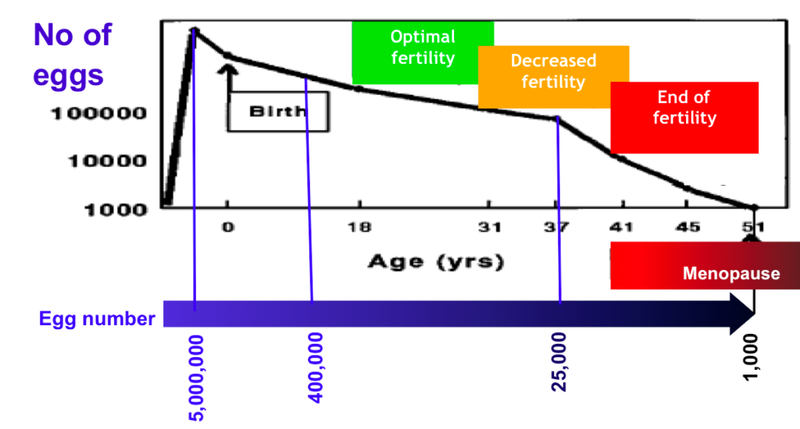Ovarian reserve and fertility
Ovarian reserve and fertility changes with age
When in her mother’s womb, a baby has about 5-7 million eggs by the fifth month of pregnancy. After this time, the number of eggs begin to decrease. Such that by the time of birth she only has 2 million eggs left in the ovaries. The egg (oocyte) numbers continue to decrease further and by the time of puberty or when regular period starts, less than half a million eggs remain within the ovaries. In other words the ovarian reserve declines quite quickly with age.This is shown in the diagram below:
Unfortunately the ovaries cannot grow or create new eggs after birth. This is different in men who can continue to produce sperm until the later decades of life. As women get older, they have fewer eggs and the quality of eggs becomes poorer. As such, one of the biggest challenges facing Fertility specialists, is how to increase the chances of older women getting pregnant.This reduced of egg quality with age leads to poorer embryos being created and therefore:
- A lower chance of pregnancy.
- Higher risk of miscarriage
- Higher risk of abnormalities such as Down’s syndrome.
Egg quality varies within the ovaries, in that some eggs would be good and others not so good. In young women, most of the eggs are of good quality, however in older women e.g. after the age of 45 years the vast majority of the eggs are of poor quality, though there will still be some good eggs.Therefore, between the ages of 16 and 45 years, the ability to conceive, changes and is lower towards the later years such as over 42 years of age.The key message from the fertility planning point of view, is to try and conceive at a younger age. Understandably this is not possible for many nor desirable, as such measures to preserve your egg quality would be advisable such as avoiding smoking.There is evidence from research that suggests supplements e.g. testosterone like substances such as DHEA can be used to potentially enhance the chances of fertility success in women with poor ovarian reserve. However, further research in this area is still required.For some the option of egg freezing may be considered, but this has to be weighed carefully taking into account your personal circumstances, age, egg (oocyte) and ovarian reserve as well as success rates. This should be discussed with a fertility specialist familiar with this practice and treatment. Whilst age remains the most simple indicator of egg quality and reserve, more specific tests such as anti-mullerian hormone (AMH), ultrasound scan of the ovaries – antral follicle count (AFC) are currently the best and most reliable tests available.
Follicle stimulation hormone (FSH) measurement can be used but has to interpreted with caution and ideally an estradiol (E2) measurement should be done at the same time to know if it’s a true reflection of your ovarian reserve.Sadly in some case where the egg reserve is very depleted, or in older women, the best chance of success would be with egg donation treatment. Egg donation treatment is where eggs from a young healthy donor are used with IVF or ICSI treatment to help you conceive. Success rates are usually around 50% per treatment cycle.Luckily for most, this treatment won’t be required and conceiving with your own eggs would be what happens.
We would be delighted to see how we can help you optimise your chances if you are older or have a reduced ovarian reserve.
Do contact us: info@BCRM.org.uk or 0117 3018605
